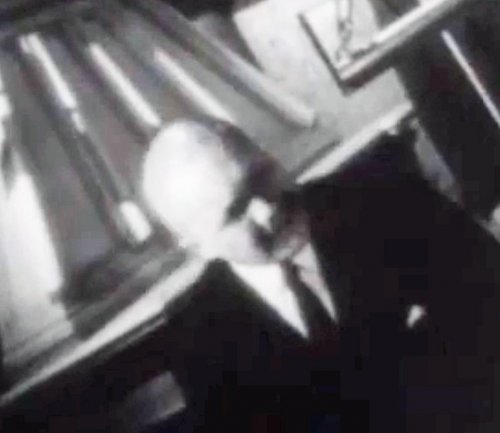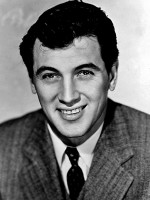Khigh Dhiegh est un Acteur Américain né le 25 aout 1910 à Spring Lake (Etats-Unis)

Khigh Alx Dhiegh (/ˌkaɪˈdiː/ KY-DEE or /ˌkaɪˈdeɪ/ KY-DAY) (born Kenneth Dickerson on August 25, 1910 in Spring Lake, New Jersey, died October 25, 1991 in Mesa, Arizona) was an American television and motion picture actor of Anglo-Egyptian-Sudanese ancestry, noted for portraying Asian roles. He is perhaps best remembered for portraying villains, in particular his recurring TV guest role as Chinese agent Wo Fat on Hawaii Five-O (from the pilot in 1968 to the final episode in 1980), and brainwasher Dr. Yen Lo in 1962's The Manchurian Candidate. He also starred in the short-lived 1975 TV series Khan! as the title character. In 1988, he was featured as Four Finger Wu in James Clavell's Noble House television mini-series. He also guest starred in Ironside (episode: "Love My Enemy") and in the Jake and the Fatman episode "Wish You Were Here."
In 1965, Dhiegh recorded and released an album on Folkways Records, entitled St. John of the Cross: Volume II, a collection of poems of St. John.
Besides his acting endeavors, Dhiegh was active in Taoist philosophy, writing a number of books on the subject, including The Eleventh Wing (ISBN 0-385-28371-7). He founded the Taoist Sanctuary (now the Taoist Institute) in Hollywood, California. Dhiegh also had a doctorate in theology, and in his later years, was the rector for a Taoist sanctuary in Tempe, Arizona called 'Inner Truth Looking Place.' He held weekly services and sponsored many 'Tea Ceremonies' in the Phoenix metro area. One of his last interviews was on One World in 1990, where he presented the concept of World Citizenry and its benefit to mankind. Dhiegh's contributions to Taoism are discussed in some detail in the book Taoism for Dummies (John Wiley and Sons Canada, 2013).
Source : Wikidata
Khigh Dhiegh

- Infos
- Photos
- Meilleurs films
- Famille
- Personnages
- Récompenses
Nom de naissance Kenneth Dickerson
Nationalité Etats-Unis
Naissance 25 aout 1910 à Spring Lake (Etats-Unis)
Mort 25 octobre 1991 (à 81 ans) à Mesa (Etats-Unis)
Nationalité Etats-Unis
Naissance 25 aout 1910 à Spring Lake (Etats-Unis)
Mort 25 octobre 1991 (à 81 ans) à Mesa (Etats-Unis)
In 1965, Dhiegh recorded and released an album on Folkways Records, entitled St. John of the Cross: Volume II, a collection of poems of St. John.
Besides his acting endeavors, Dhiegh was active in Taoist philosophy, writing a number of books on the subject, including The Eleventh Wing (ISBN 0-385-28371-7). He founded the Taoist Sanctuary (now the Taoist Institute) in Hollywood, California. Dhiegh also had a doctorate in theology, and in his later years, was the rector for a Taoist sanctuary in Tempe, Arizona called 'Inner Truth Looking Place.' He held weekly services and sponsored many 'Tea Ceremonies' in the Phoenix metro area. One of his last interviews was on One World in 1990, where he presented the concept of World Citizenry and its benefit to mankind. Dhiegh's contributions to Taoism are discussed in some detail in the book Taoism for Dummies (John Wiley and Sons Canada, 2013).
Le plus souvent avec
Filmographie de Khigh Dhiegh (9 films)
Acteur

Forbidden Nights (1990)
, 1h36Réalisé par Waris Hussein
Origine Etats-Unis
Genres Drame
Acteurs Melissa Gilbert, Khigh Dhiegh, Melissa Sue Anderson, Robin Shou, Victor Wong, Tzi Ma
Rôle Lu Ming
Note69%





Set in Red China in 1979, the film focuses on Judith Shapiro, an American teacher who falls in love with Liang Hong, a Chinese radical, trying to bring political reform to his homeland. She puts all her wishes and dreams away to fit into his ideals, but soon, trouble starts to come.

Goin' Coconuts (1978)
, 1h36Réalisé par Howard Morris
Origine Etats-Unis
Genres Comédie, Aventure, Musical
Thèmes Musique
Acteurs Donny Osmond, Marie Osmond, Herb Edelman, Kenneth Mars, Ted Cassidy, Marc Lawrence
Rôle Wong
Note40%





While performing with Donny in Hawaii, Marie acquires a lovely necklace, unaware that it's coveted by a group of thieves and by a mysterious woman.

Satan, mon amour (1971)
, 1h55Réalisé par Paul Wendkos, David S. Hall
Origine Etats-Unis
Genres Fantastique, Horreur
Thèmes La musique, Religion, Diable, Films pour enfants
Acteurs Alan Alda, Jacqueline Bisset, Barbara Parkins, Bradford Dillman, William Windom, Curd Jürgens
Rôle Zanc Theun
Note60%





Ely, un célèbre pianiste, initie un journaliste musical, Myles Clarkson, à certaines pratiques de sorcellerie. À la mort d'Ely, l'esprit de ce dernier s'empare du corps du journaliste, qui devient du jour au lendemain, un pianiste génial. Paula, son épouse, constate des changements chez son mari et découvre qu'il a passé un pacte avec le Diable.

Le Maître des îles (1970)
, 2h14Réalisé par Tom Gries
Origine Etats-Unis
Genres Drame, Aventure, Romance
Thèmes La mer, Transport
Acteurs Charlton Heston, Geraldine Chaplin, Mako Iwamatsu, Bette Midler, John Phillip Law, Alec McCowen
Rôle Kai Chung
Note60%





Dans les îles hawaïennes au XIX siècle. Un aventurier (Whip Hoxworth) descendant d'une riche famille américaine de planteurs hérite de terres après la mort de son père ; il va découvrir de l'eau et développer la culture de l'ananas. Avant de devenir le plus gros planteur d'Hawaï, Whip faisait du commerce avec des Chinois. Sa femme (Purity), descendante d'une famille noble de Hawaï, lui donne un fils qu'ils nommeront Noël puis les quitte. Whip élève son fils aidé par un couple de Chinois qui ont cinq enfants.

L'Opération diabolique (1966)
, 1h40Réalisé par John Frankenheimer
Origine Etats-Unis
Genres Drame, Science-fiction, Thriller, Horreur
Acteurs Rock Hudson, Salome Jens, John Randolph, Will Geer, Richard Anderson, Jeff Corey
Rôle Davalo
Note75%





Arthur Hamilton est un homme d'âge mûr, marié, travaillant dans une banque à un poste haut placé. Un soir, il reçoit un coup de téléphone de Charlie Evans, un ancien ami qu'il croyait mort. Charlie, qui l'avait déjà appelé hier, le convainc qu'il n'est pas mort, et lui propose un rendez-vous le lendemain. Hésitant, Arthur finit par se rendre à l'adresse donnée, où se trouve une blanchisserie. De là il est envoyé vers un abattoir, où il est mené dans un fourgon et convoyé jusque dans un bâtiment. Il est reçu par Ruby, qui lui explique qu'il peut s'engager dans un programme lui permettant de démarrer une nouvelle vie en échange de 30 000 dollars. Cet argent couvre entre autres les frais de chirurgie esthétique, et l'acquisition et la transformation d'un cadavre qui permet de simuler sa mort. N'acceptant pas tout de suite, d'une part Ruby le menace, d'autre part le créateur de la compagnie le convainc qu'il n'a pas d'attache solide dans sa vie actuelle. Il finit par signer le contrat.

Comment tuer votre femme (1965)
, 1h58Réalisé par Richard Quiney
Origine Etats-Unis
Genres Comédie, Romance
Thèmes La bande dessinée
Acteurs Jack Lemmon, Virna Lisi, Terry-Thomas, Claire Trevor, Eddie Mayehoff, Sidney Blackmer
Rôle Bald Actor Playing Thug
Note64%





Stanley Ford (Jack Lemmon) est un auteur de bande dessinée à succès qui raconte chaque jour les aventures de Bash Brannigan, agent secret. Célibataire endurci, il vit avec son majordome Charles Firbank (Terry-Thomas) une vie réglée et immuable. Un jour, sous l'emprise de l'alcool, il épouse une strip-teaseuse italienne (Virna Lisi) qui ne tarde pas à prendre une grande place dans son existence. Stanley Ford ne rêve alors que de sortir de cette situation. Dans ses bandes dessinées, il fait commettre à Bash Brannigan le meurtre de son épouse. Mrs. Ford a disparu et le public commence à penser que Bash Brannigan est peut-être une bande dessinée autobiographique.

13 filles terrorisées (1963)
, 1h29Réalisé par William Castle
Origine Etats-Unis
Genres Thriller, Comédie, Aventure, Espionnage
Thèmes Espionnage, Féminisme, Politique, Buddy movie
Acteurs Murray Hamilton, Hugh Marlowe, Khigh Dhiegh, Norma Varden, Alexandra Bastedo, Lynne Sue Moon
Rôle Kang
Note52%





Treize jeunes filles d'une pension en Suisse, et spécialement l'une d'entre elles, Candace Hull, s'amusant à jouer les enquêtrices amateurs se retrouvent impliquées dans une affaire d'espionnage très sérieuse, sur fond de guerre froide…

Un crime dans la tête (1962)
, 2h3Réalisé par John Frankenheimer
Origine Etats-Unis
Genres Drame, Thriller, Noir
Thèmes L'amnésie, Assassinat, Espionnage, La famille, Politique, Sexualité, Politique
Acteurs Frank Sinatra, Laurence Harvey, Janet Leigh, Angela Lansbury, Henry Silva, James Gregory
Rôle Dr. Yen Lo
Note78%





Raymond Shaw (Laurence Harvey) est un médaillé de la Guerre de Corée pour faits d'armes. Cependant, Bennett Marco (Frank Sinatra), commandant, à l'époque, le peloton de Shaw, a des doutes sur ces exploits. De plus, il est assailli de cauchemars troublants qui vont l'amener à enquêter avec la CIA et le FBI sur R. Shaw. Qui est réellement celui-ci ? Adulé ou haï par ses hommes ? Héros de guerre ou agent communiste infiltré aux États-Unis ? Tueur de sang-froid ou psychopathe manipulé par une mère abusive ? Ou tout cela à la fois ?

La Chute des héros (1957)
, 1h36Réalisé par Karl Malden
Origine Etats-Unis
Genres Drame, Guerre
Thèmes Politique, La prison, Politique, Adaptation d'une pièce de théâtre
Acteurs Richard Widmark, Richard Basehart, Dolores Michaels, June Lockhart, Martin Balsam, Carl Benton Reid
Rôle Col. Kim (as Kaie Deei)
Note72%





Guerre de Corée. Après avoir été fait prisonnier, un G.I. (Richard Basehart, le major Harry Cargill) est accusé de collaboration avec l'ennemi, notamment d'avoir donné à ses codétenus des cours de marxisme-léninisme. Un avocat le défend (Richard Widmark, le colonel William Edwards). Histoire de lavage de cerveau, ou un avant-goût des films sur la guerre du Viêt Nam.
 Connexion
Connexion



